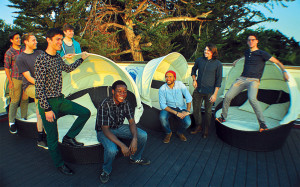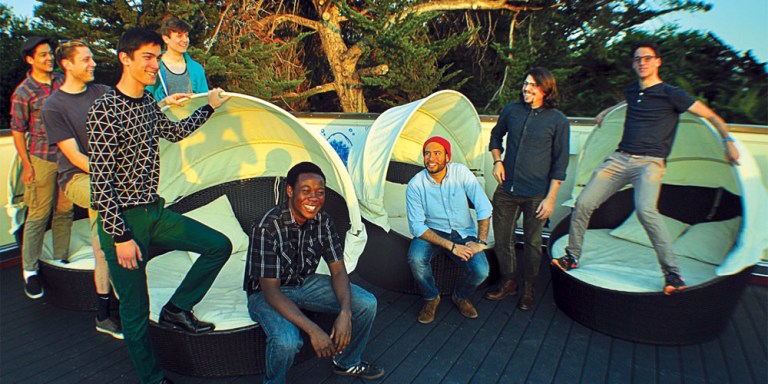
The story of Paper Void’s creation began in the summer of 2013 when guitarist Gavin Leeper ‘13 M.S.’14 completed the Jazz Guitar Intensive at the Jazz School at Berkeley. On the second mile of his meditative run, he was thinking about music he loved — Zero 7’s album, “Simple Things,” for instance —when it occurred to him that this was the type of music he could be making with others.
The same day, he began to contact musicians for an eight-piece band. A few days later, he met with lead singer, JP Wright ‘12, former front man of an up-tempo band, The Irregulars, to discuss the logistics of running a band. By the end of September, the band had had its first rehearsal.
From the start, the project was ambitious — “The Downtempo Band Vision,” Leeper’s initial band write-up, projected for the band’s first gig to be in fall quarter.
“I’m just saying, I want this project to go places and go there quickly,” he wrote.
By week six, Leeper, who had already been in contact with the Community Managers of several co-ops through previous DJ-ing gigs, secured a slot at Kairos’ Wine and Cheese on Wednesdays. Afterwards, Paper Void continued to perform through the year at Snowchella, the Enchanted Broccoli Forest and Maggie McGarry’s in San Francisco.
The band performed at Beltane last Saturday and will be opening at Frost on May 17. Come the end of June, Paper Void will finally be releasing their extended play of five songs.
One of the few points of indecision the band has faced is the band name. Previously named “The Downtempo Project” and “Shola,” the band finally decided on “Paper Void.”
While the band’s sound still reflects downtempo music, a genre from the ‘90s that knead together electronic music, funk, jazz and hip-hop, the band wanted to use the band name to emphasize a juxtaposition.
Although the music is downtempo, Leeper said, “We play it at high energy and there’s this contrast, similar to the name — paper is this thin material while void is infinite and amorphous.”
There is also a second meaning to the name. Leeper was inspired by his experience abroad in Japan in spring 2012. In Japanese, ma is a character that roughly means “space,” such as in calligraphy, where shaping the white space of a page is just as important as focusing on the brush strokes; or “pause,” such as in music.
Ma is particularly important for an eight–piece band. While the band members — also including bassist Evan Gitterman ‘14, keyboardist Jeremy Schreier ‘14 and drummer Alex Favaro ’12 — have since become closer through the medium of music, they were initially just acquaintances, both musically and socially.
For jazz-style music especially, this set-up could potentially be problematic.
“When you’re improvising in jazz, you’re supporting each other through music,” Schreier said. “The more you play with each other, the more familiar you are with each others’ styles. Being friends outside of music can add more depth to the music — it’s an extra level of trust.”
And yet, as the band recently proved at Beltane, they had “refined the ma,” Leeper said. In songs such as their cover of Submotion Orchestra’s “All Night,” the synchronization is tangible when the music suspends for just a moment — before blooming in the warm spring air again.
A week ago, Leeper drove me and my editor to Paper Void’s bi-weekly rehearsal.
“Oh yeah, new development,” he said. “One of our singers can’t make it to Beltane.”
Beltane is Synergy’s annual pagan festival that took place this past Saturday. The guest singer was a devout Christian.
“Wow,” I said.
“It’s okay,” he said. “We’ll make it work.”
He maneuvered his Audi onto the pathway bordering the Band Shak.
“Are you allowed to park here?” I asked.
“Yeah,” he said, lining his car up with the building. A cluster of brass instrumentalists from the Stanford Marching Band looks up from practice.
“Well, it’s actually a loading zone,” he clarifies. “Some guy comes in and yells at us sometimes — but it’s okay.”
Leeper wears his hair long, his flannels tartan, his jeans rolled. His attitude is best described as zen.
“I try to live on purpose,” he said when asked about his life philosophy. Did he mean “with purpose”? “On purpose — like intentionally.”
Apart from having studied meditation in Japan, he also meditates through running — “No music,” he said. “I count my breaths. It returns me to my center.”
Apparently, he meditates during practice. The band members are running through their set for Beltane; versions of “That sounded good,” and “What if we did this?” are tossed around.
“Yeah, yeah, I like that” Gavin says at one point, and while his guitar is still slung across his body, he casually reaches up, then out, into a perfectly balanced yoga tree pose.
Leeper’s taste in music is colored with elements of this philosophy — he calls it “mindful music,” and it is complex while centered on a simple yet profound idea, something he mulls over and turns around in his head. When he traveled over two hours from Kyoto to Tokyo to see the concert of one of his favorite bands, Cinematic Orchestra, Leeper found his mind wandering and instantly felt guilty.
“I went through a lot to get to the show, and I felt I needed to be present there,’” he said. “But then I realized, it’s okay if my mind wanders. This is a pensive show.”
The pensive experience has been an influence on his vision for Paper Void.
“I want to inspire in the way I’ve been inspired,” he said. “I want to do it in the most accessible way, and not in a snobby sense — very technical music, but technical in a way that you don’t notice. Something that doesn’t turn off the folks who have never listened to music like that before.”
Very technical music is something that keeps the band together. For their ideal band, the band members of Paper Void cite Hiatus Kaiyote, “multi-dimensional polyrhythmic gangster shit,” according to the band website, and a neo-soul band, according to Wikipedia.
“I’ve been obsessing over them for a year,” Gitterman said. “They’ve managed to fuse a multitude of genres that are both musically interesting and intellectually interesting, but also incredibly visceral and groove-filled.”
The personal goal of improving keeps each individual band member going in the band.
“I get bored easily — that’s why I could never be the bass in a traditional rock band,” Gitterman said, who sometimes composes with Leeper. “But I really like the direction [Paper Void] has gone in. Even when we’re recording, people are doing new things — sometimes good, sometimes not so good, but at least I never feel like I’m stuck in a rut.”
When asked about the most difficult thing Paper Void has had to overcome, MC Alberto Guzman ‘13 paused. “I haven’t really thought about it. It’s all very seamless.”
Leeper does handle a lot as the de-facto bandleader — gigs, media, rehearsals. After all, Paper Void was initially his idea, his project. He is professional, hyper-organized, laidback, all at once.
Everything he plans for the band is intentional, from the structure of rehearsal (loosely modeled after Stanford Taiko, where Leeper was performance manager for a year) to the people in the band (all incredibly talented to minimize time spent outside of practice, but also incredibly reliable).
Recently, the members have each been taking on side roles to help with the expanding project.
While the members did not know each other very well to begin with, the skill of each individual was so high that, as trumpeter player Isaac Ghansah ‘13 M.S. ‘14 said, “It’s never a question of whether we can do it, but how we’re going to do it.”
Tenor saxophonist Alex Ramsey ‘17 is the youngest and least experienced member of Paper Void, which he caveated several times. But even he has had a solo in nearly every gig so far.
“When I’m nervous about soloing, Gavin’s always like, ‘Take more solos!’” Ramsey said. “Then I realize it’s just me being nervous. I mean, it’s nerve-wracking because we’re playing for these big-deal shows where everyone already has to step up their game, and I feel I need to play at their level — but I’m looking forward to having more time to work on technical ability over summer at home, maybe come down for the weekends.”
When asked how far home is, Ramsey said, “Three hours, but the commute is worth it.”
Of the eight members of the band, Favaro commutes for rehearsals from San Francisco to Stanford two days a week, and then extra days for gigs. Wright, too, commuted from San Francisco for the band up until this past Thursday when he officially left Paper Void because of his work hours and to focus more on his own music production.
“Commuting is probably the hardest part,” Favaro said. “But it’s worth it for me to keep playing music. If I weren’t in this band, it’d be hard for me to improve as a player, to justify playing.”
Near the end of practice, Schreier and Leeper hit the first two chords of Hiatus Kaiyote’s “Nakamarra,” first performed at EBF’s Happy Hour when I first heard Paper Void. Upon hearing the major sevenths, the atmosphere immediately changes.
Everyone is swaying to the music, and they take turns passing the microphone around, crooning, “We’ll see in time, opening our hearts/And nurturing our minds to shine/I love you, I love you, I do.”
The band has only been playing together for nine months, and “Nakamarra” has been with them since December as one of their most familiar songs. While it hasn’t been played at many gigs, Leeper said that people have come up to the band and demanded for it to be played.
When I asked how the band became closer, Schreier said, “Music brings people together.”
And indeed, The Downtempo Project has been more than just a project — it has grown into Paper Void.
Contact Irene Hsu at ihsu5595 ‘at’ Stanford ‘dot’ edu.
